Hybrid work
Resilient and loyal contraries


Is your business ready for hybrid working?
Marc Moris
Director Corporate Prevention & Protection at Proximus
“There is a new balance between larger spaces for teamwork and adapted rooms for videoconferencing, client meetings, co-creation and focused work, among other things."
Today, working from home and sporadic work at the office remain the norm. Hybrid working is the new reality at Proximus too. And smarter choices need to be made when using digital tools, activity-based working and more.
Coronavirus also causes turbulent times in the business world. “The government systematically determines per period of time compulsory working at home for those who are able to do so,” says Marc Moris, Director Corporate Prevention & Protection at Proximus. “But that doesn't work for our technicians, for example. They continue to work on the street and with customers. Of course, we provide extra protection measures for them.” For the homeworkers, we pay a lot of attention to their well-being. “It's easy to forget that working from home is not straightforward and easy for everyone,” said Moris. “Think of young starters who share a small bedsitter or couples who are suddenly forced to stay at home in the middle of a divorce settlement.”
In the meantime, the coronavirus measures change on a regular basis. Proximus employees gradually returned to the office. “Initially, we ask staff to come to the office at least one day a week, in order to reconnect with the company and colleagues,” Moris explained. “We want to evolve step by step towards a new work-life balance: two days working at the office, three days of homeworking, of course only if the coronavirus measures allow it at that time.” Proximus is taking into account the government's announced tightening of regulations on homeworking and is adjusting its own measures accordingly.
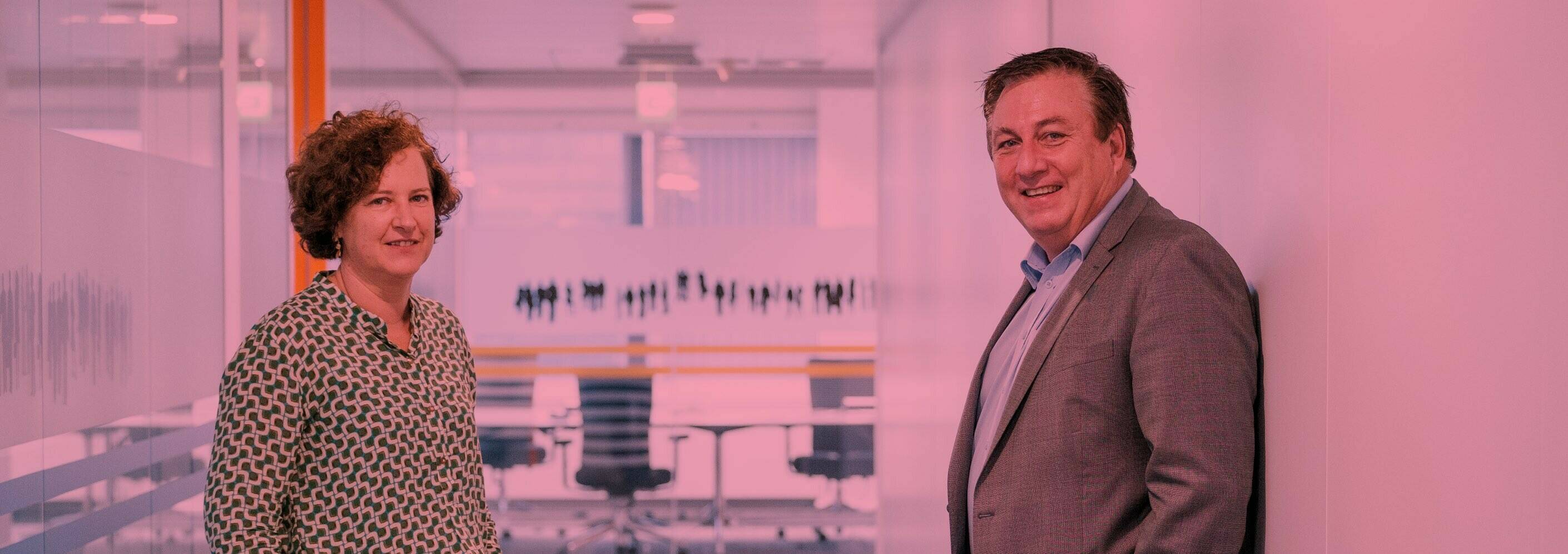

Kathleen Vande Kerckhove
studied educational sciences at the KU Leuven. She then worked at USG People and Delhaize. In 2018 she joined Proximus. Since the beginning of this year she has been Director People & Organizational Development.

Marc Moris
studied ‘technical problems relating to safety issues’ at Antwerp University. He has a background as a fire chief and prevention advisor. He has been working at Proximus for almost twenty years and, since 2018, as Director Corporate Prevention & Protection.

Togetherness
As far as possible, employees come to the office at least once a week. That is important for Proximus. “If you always work from home, alone, then the sense of belonging disappears,” says Kathleen Vande Kerckhove, Director People & Organizational Development at Proximus. “Being part of a team is important and that is best achieved by meeting each other in person on a regular basis.” This is especially important for new employees. “If you're new to a company and you've never been to the office, you don't get a feel for the culture and it's more difficult to get involved,” said Vande Kerckhove.
In order to harmonize office and homeworking as much as possible and to get everyone involved in hybrid working, Proximus provides additional communication via the company's intranet. There the employees will find all information about the applicable measures and practical agreements regarding hybrid working. At the same time, Proximus is adjusting the layout of its buildings. “We are turning our offices into an open campus,” Moris explained. “There is a new balance between larger spaces for teamwork and adapted rooms for videoconferencing, client meetings, co-creation and focused work, among other things.”
New balance
“We believe in activity-based working,” said Vande Kerckhove. “Some activities are best done at home while, for others, it's better to come to the office. It's just not always the same for everyone. You can't just define things strictly. That's why we think it’s important that this is agreed at the team level, so that each team finds the most suitable training.”
Well-being remains an important focus. “During the lockdowns, it is sometimes difficult to balance work and private life,” Vande Kerckhove continued. “It is the lack of perspective that is so hard on a lot of people. It then becomes apparent how important the connection with colleagues is: the moments before and after meetings, for example, when there is informal contact. You soon miss that when you work from home.”
But apart from connection, disconnection is also important. When you are continually working from home, there is a danger that the work never stops. For Proximus, it is vital that employees find a new and correct balance in hybrid working. “I see that as an opportunity,” said Vande Kerckhove. “By working in a hybrid way, employees can adjust their work-life balance more to their liking.” At the same time, the managers are adapting their style. “We encourage them to have faith in their teams, to relinquish control a little, and to focus more on outcome rather than presence.”
Inspiration for other companies
“At Proximus, there is very open communication between employees and the organization,” said Moris. “By actively listening to the needs and experiences of our employees, we, as an organization, can provide the right support. This ranges from the CEO's weekly message, to the intranet which, in turn, extends to HR, for example, with all kinds of support, e-learning, and so on.”
We also help our team leaders to enter into a dialogue about this with their employees by means of adapted and supportive tools.These are applied in a very practical way to determine how work will be organized at team level in the future. It is an approach that is also inspiring other companies. “There are indeed large organizations that come to us to see how we approach things”, Moris concluded. “Our starting-point continues to be the most essential element in this: we always put our employees first.”
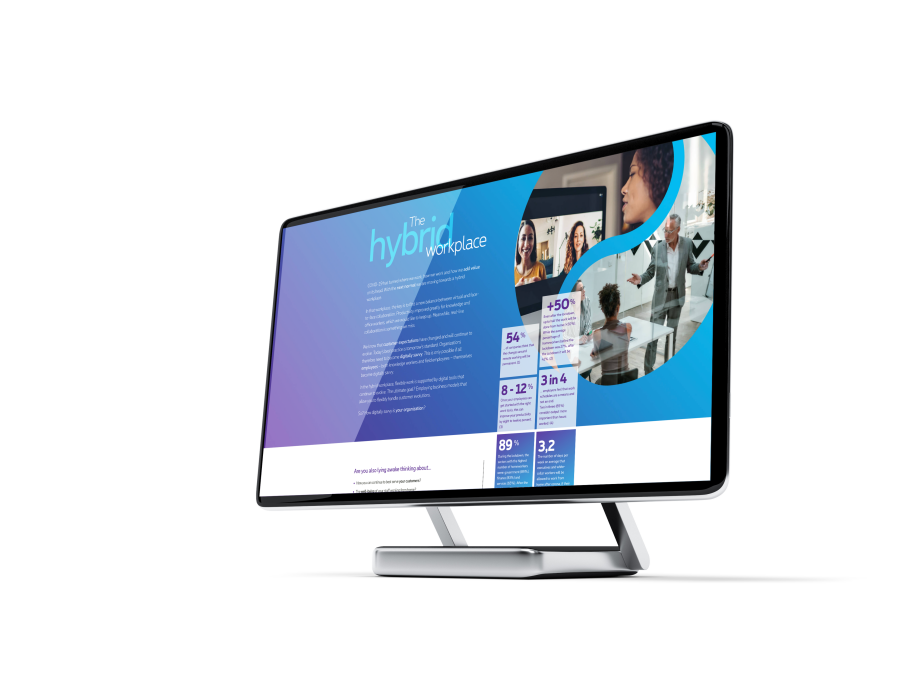
Read the e-book
The hybrid workplace will be a mixture of working partly at home, partly in the office and partly from anywhere. In our e-book 'The Hybrid Workplace', you will learn what the impact is for your organisation.
Switch to hybrid work
Kathleen Vande Kerckhove
Director People & Organisational Development at Proximus
"By working in a hybrid way, employees can adjust their work-life balance more to their liking.”

EXPERT INTERVIEW
78,000 Walloon companies looking for the right balance
When you want to take the temperature of the 78,000 Walloon companies, asking Olivier de Wasseige, Managing Director and Director-General of the UWE, is a good idea. From his perspective, the pandemic has accelerated digitization and hybrid work in a sustainable way. But the challenge of adaptation remains great, especially for small businesses.
“Telework can also lead to isolation so you have to strike the right balance,” Olivier de Wasseige insists. He also highlights the challenge of equipment, particularly for small structures.
“Remote working means setting up videoconferencing software. During the lockdowns, we did some tinkering, but we need powerful and secure tools to be able to work on efficient access and information sharing, document backup, server storage, etc. One additional factor for the choice of these tools is the use of consultancy to ensure a holistic approach to all the IT and HR aspects of remote collaboration,” he said.
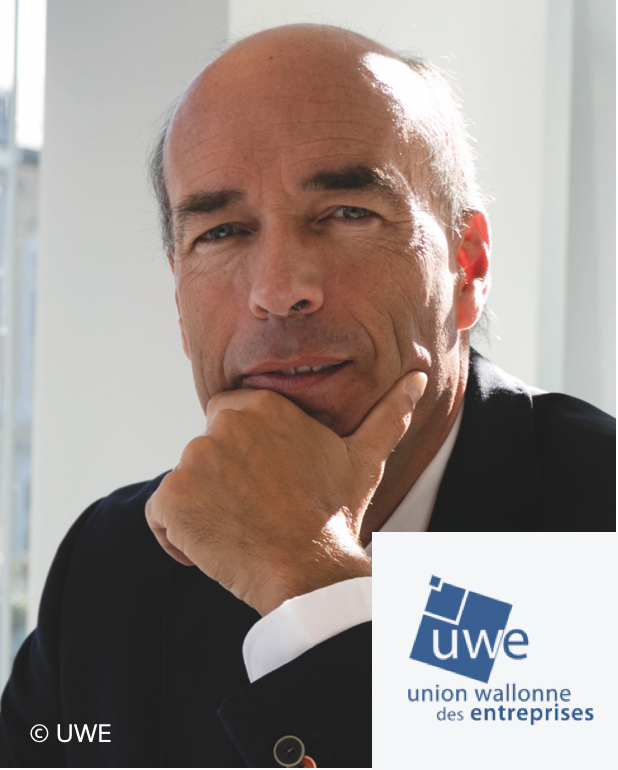
Olivier de Wasseige
Managing Director and Director-General of the Union Wallonne des Entreprises (UWE)
According to Olivier de Wasseige there are three areas where the pandemic has accelerated digitization.
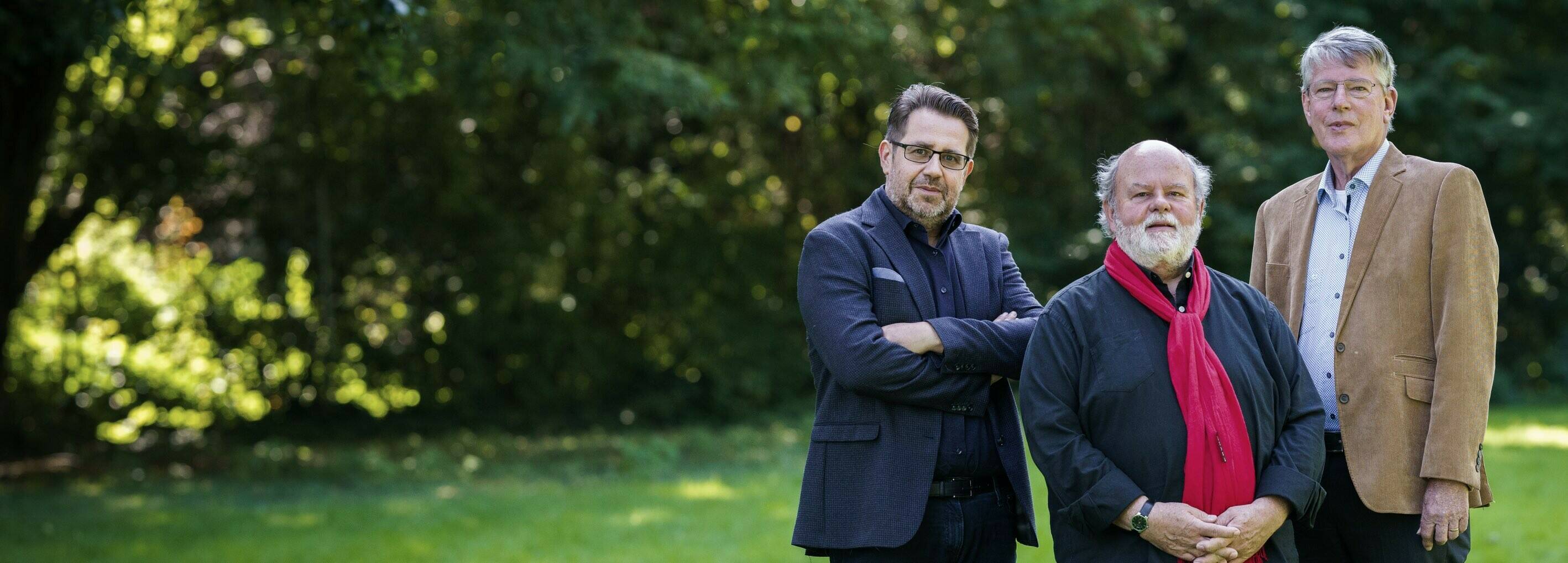
Find out more
EXPERT INTERVIEW
Resilient organization requires agile people and new skills
The COVID-19 crisis has turned the HR rules in companies and organizations upside-down. Digital transformation demands the utmost from employees. Resilience and agility are central to this. How does hybrid work fit into this picture? Matthieu Weggeman, Jimme Keizer and Bart Derre, all of whom closely follow this theme and keep their finger on the pulse of new HR-trends, explain what they mean.

Hybrid work
Resilient and loyal contraries

Is your business ready for hybrid working?
Marc Moris
Director Corporate Prevention & Protection at Proximus
“There is a new balance between larger spaces for teamwork and adapted rooms for videoconferencing, client meetings, co-creation and focused work, among other things."
Today, working from home and sporadic work at the office remain the norm. Hybrid working is the new reality at Proximus too. And smarter choices need to be made when using digital tools, activity-based working and more.
Coronavirus also causes turbulent times in the business world. “The government systematically determines per period of time compulsory working at home for those who are able to do so,” says Marc Moris, Director Corporate Prevention & Protection at Proximus. “But that doesn't work for our technicians, for example. They continue to work on the street and with customers. Of course, we provide extra protection measures for them.” For the homeworkers, we pay a lot of attention to their well-being. “It's easy to forget that working from home is not straightforward and easy for everyone,” said Moris. “Think of young starters who share a small bedsitter or couples who are suddenly forced to stay at home in the middle of a divorce settlement.”
In the meantime, the coronavirus measures change on a regular basis. Proximus employees gradually returned to the office. “Initially, we ask staff to come to the office at least one day a week, in order to reconnect with the company and colleagues,” Moris explained. “We want to evolve step by step towards a new work-life balance: two days working at the office, three days of homeworking, of course only if the coronavirus measures allow it at that time.” Proximus is taking into account the government's announced tightening of regulations on homeworking and is adjusting its own measures accordingly.

Kathleen Vande Kerckhove
studied educational sciences at the KU Leuven. She then worked at USG People and Delhaize. In 2018 she joined Proximus. Since the beginning of this year she has been Director People & Organizational Development.
Marc Moris
studied ‘technical problems relating to safety issues’ at Antwerp University. He has a background as a fire chief and prevention advisor. He has been working at Proximus for almost twenty years and, since 2018, as Director Corporate Prevention & Protection.


Togetherness
As far as possible, employees come to the office at least once a week. That is important for Proximus. “If you always work from home, alone, then the sense of belonging disappears,” says Kathleen Vande Kerckhove, Director People & Organizational Development at Proximus. “Being part of a team is important and that is best achieved by meeting each other in person on a regular basis.” This is especially important for new employees. “If you're new to a company and you've never been to the office, you don't get a feel for the culture and it's more difficult to get involved,” said Vande Kerckhove.
In order to harmonize office and homeworking as much as possible and to get everyone involved in hybrid working, Proximus provides additional communication via the company's intranet. There the employees will find all information about the applicable measures and practical agreements regarding hybrid working. At the same time, Proximus is adjusting the layout of its buildings. “We are turning our offices into an open campus,” Moris explained. “There is a new balance between larger spaces for teamwork and adapted rooms for videoconferencing, client meetings, co-creation and focused work, among other things.”
New balance
“We believe in activity-based working,” said Vande Kerckhove. “Some activities are best done at home while, for others, it's better to come to the office. It's just not always the same for everyone. You can't just define things strictly. That's why we think it’s important that this is agreed at the team level, so that each team finds the most suitable training.”
Well-being remains an important focus. “During the lockdowns, it is sometimes difficult to balance work and private life,” Vande Kerckhove continued. “It is the lack of perspective that is so hard on a lot of people. It then becomes apparent how important the connection with colleagues is: the moments before and after meetings, for example, when there is informal contact. You soon miss that when you work from home.”
But apart from connection, disconnection is also important. When you are continually working from home, there is a danger that the work never stops. For Proximus, it is vital that employees find a new and correct balance in hybrid working. “I see that as an opportunity,” said Vande Kerckhove. “By working in a hybrid way, employees can adjust their work-life balance more to their liking.” At the same time, the managers are adapting their style. “We encourage them to have faith in their teams, to relinquish control a little, and to focus more on outcome rather than presence.”
Inspiration for other companies
“At Proximus, there is very open communication between employees and the organization,” said Moris. “By actively listening to the needs and experiences of our employees, we, as an organization, can provide the right support. This ranges from the CEO's weekly message, to the intranet which, in turn, extends to HR, for example, with all kinds of support, e-learning, and so on.”
We also help our team leaders to enter into a dialogue about this with their employees by means of adapted and supportive tools.These are applied in a very practical way to determine how work will be organized at team level in the future. It is an approach that is also inspiring other companies. “There are indeed large organizations that come to us to see how we approach things”, Moris concluded. “Our starting-point continues to be the most essential element in this: we always put our employees first.”
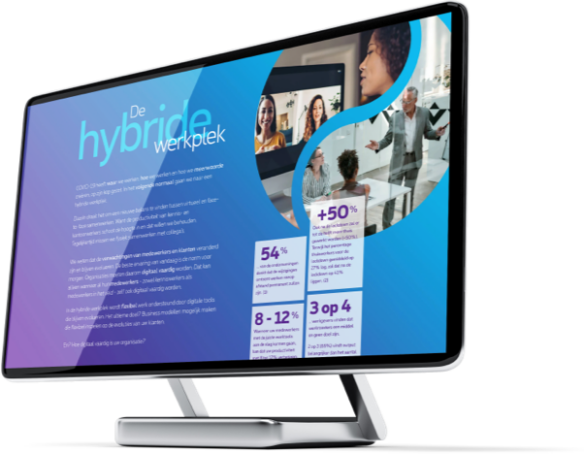
Read the e-book
The hybrid workplace will be a mixture of working partly at home, partly in the office and partly from anywhere. In our e-book 'The Hybrid Workplace', you will learn what the impact is for your organisation.
Kathleen Vande Kerckhove
Director People & Organisational Development at Proximus
"By working in a hybrid way, employees can adjust their work-life balance more to their liking.”
Switch to hybrid work

EXPERT INTERVIEW
78,000 Walloon companies looking for the right balance
When you want to take the temperature of the 78,000 Walloon companies, asking Olivier de Wasseige, Managing Director and Director-General of the UWE, is a good idea. From his perspective, the pandemic has accelerated digitization and hybrid work in a sustainable way. But the challenge of adaptation remains great, especially for small businesses.
“Telework can also lead to isolation so you have to strike the right balance,” Olivier de Wasseige insists. He also highlights the challenge of equipment, particularly for small structures.
“Remote working means setting up videoconferencing software. During the lockdowns, we did some tinkering, but we need powerful and secure tools to be able to work on efficient access and information sharing, document backup, server storage, etc. One additional factor for the choice of these tools is the use of consultancy to ensure a holistic approach to all the IT and HR aspects of remote collaboration,” he said.
According to Olivier de Wasseige there are three areas where the pandemic has accelerated digitization.

Olivier de Wasseige
Managing Director and Director-General of the Union Wallonne des Entreprises (UWE)

Find out more
EXPERT INTERVIEW
Resilient organization requires agile people and new skills
The COVID-19 crisis has turned the HR rules in companies and organizations upside-down. Digital transformation demands the utmost from employees. Resilience and agility are central to this. How does hybrid work fit into this picture? Matthieu Weggeman, Jimme Keizer and Bart Derre, all of whom closely follow this theme and keep their finger on the pulse of new HR-trends, explain what they mean.
